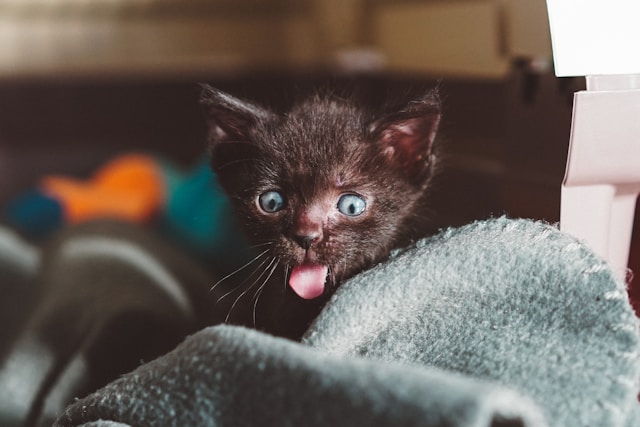Black cats have long been subjects of superstition, folklore, and intrigue. Despite their enigmatic reputation, these cats are as diverse and loving as any other feline companions. In this comprehensive guide, we will explore common myths about black cats, present fascinating facts, and discuss why they make wonderful pets. Let’s dive into the world of black cats and dispel some of the misconceptions surrounding them.
1. Understanding Black Cats
A. Historical Significance
- Ancient Egypt:
- Black cats were revered in ancient Egypt, where they were associated with the goddess Bastet, who was the goddess of home, fertility, and protection. Bastet was often depicted with a cat’s head, and black cats were considered to bring good fortune and protection to the household.
- Medieval Europe:
- During the Middle Ages, black cats became associated with witchcraft and superstitions. They were often believed to be witches’ familiars or shape-shifted witches themselves, leading to a decline in their popularity and safety.
B. Modern Perceptions
- Cultural Variations:
- In some cultures, black cats are still considered symbols of good luck and prosperity. For example, in Japan, black cats are believed to bring good fortune and protect against bad luck.
- Contemporary Views:
- Today, black cats are increasingly recognized for their beauty and unique personalities, though some superstitions still linger.
2. Common Myths About Black Cats
A. Myths and Superstitions
- Bad Luck:
- One of the most pervasive myths is that black cats bring bad luck. This superstition is often rooted in medieval beliefs and has been perpetuated by cultural representations in literature and media.
- Witches’ Companions:
- The idea that black cats are witches’ familiars or are associated with dark magic is a product of historical witch hunts and has no basis in fact.
- Disease-Carriers:
- There is no scientific evidence to support the claim that black cats are more likely to carry diseases than cats of other colors.
B. Debunking the Myths
- Scientific Evidence:
- Studies have shown that black cats are no more likely to have health issues than cats of other colors. The myths about black cats carrying disease are unfounded and lack scientific backing.
- Cultural Impact:
- Superstitions about black cats have been largely debunked by modern understanding. However, they still influence perceptions and can impact the adoption rates of black cats.
3. Fascinating Facts About Black Cats
A. Genetic Variations
- Genetics and Coat Color:
- The black coat color in cats is the result of a specific gene known as the “black gene.” This gene causes the fur to appear black, but black cats can come in various shades and may have subtle color variations in their coats.
- Breed Diversity:
- Black cats can be found in numerous breeds, including the Bombay, Maine Coon, and British Shorthair. Each breed has its unique characteristics and traits, but all can have a beautiful black coat.
B. Behavioral Traits
- Personality:
- Black cats are no different in personality from cats of other colors. They can be affectionate, playful, and independent. Their behavior is influenced more by their individual temperament and upbringing than by their coat color.
- Popularity:
- Despite myths, many people find black cats to be loving and loyal pets. Their striking appearance and varied personalities make them wonderful companions.
4. The Benefits of Adopting a Black Cat
A. Unique Appearance
- Elegant and Sleek:
- Black cats often have a sleek, elegant appearance that many find attractive. Their shiny, jet-black coats can highlight their striking features and enhance their unique charm.
- No Fur Stains:
- Black cats are less likely to show dirt and stains on their fur, which can make them easier to maintain compared to lighter-colored cats.
B. Adoption Benefits
- Reducing Overpopulation:
- Black cats are often overlooked in shelters due to lingering superstitions and the higher number of black cats born. Adopting a black cat helps reduce pet overpopulation and provides a loving home to a deserving animal.
- Personal Rewards:
- Many adoptive families find that black cats are just as loving and rewarding as cats of any other color. The experience of adopting a black cat can be incredibly fulfilling.
5. How to Care for a Black Cat
A. General Care
- Grooming:
- Regular grooming is important to keep any cat, including black cats, healthy and happy. Black cats’ fur can sometimes show dust and dirt more than other colors, so routine brushing is beneficial.
- Health Monitoring:
- As with all cats, regular vet check-ups and vaccinations are important for maintaining your black cat’s health. Their coat color does not affect their overall health.
B. Addressing Myths
- Education:
- Educate yourself and others about the myths and truths surrounding black cats. Promoting accurate information can help dispel myths and encourage more people to consider adopting black cats.
- Community Involvement:
- Support local shelters and adoption events that focus on finding homes for black cats. Advocacy and awareness can help change perceptions and increase adoption rates.
6. Conclusion
Black cats have been the subject of many myths and superstitions over the years, but the truth is that they are as diverse and loving as any other feline. Understanding the history, debunking the myths, and recognizing the facts can help us appreciate the unique beauty and personalities of black cats.
By adopting a black cat, you are not only providing a loving home to a deserving animal but also challenging outdated stereotypes and contributing to the welfare of cats in shelters. Whether you are considering adopting a black cat or simply wish to learn more, embracing the truth about these fascinating felines can lead to a deeper appreciation and affection for them.
Black cats are not only a symbol of mystery and elegance but also loyal companions who deserve our love and respect.











Leave a Reply